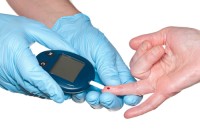 Researchers today are trying to work on a novel way of measuring blood glucose levels. Patients with diabetes need to measure blood sugar levels regularly in order to manage the disease more effectively. But doing so requires the usual pinprick on the fingers, which can be quite a hassle to many diabetics today. Using a laser may someday do away with this method and would be a less invasive alternative.
Researchers today are trying to work on a novel way of measuring blood glucose levels. Patients with diabetes need to measure blood sugar levels regularly in order to manage the disease more effectively. But doing so requires the usual pinprick on the fingers, which can be quite a hassle to many diabetics today. Using a laser may someday do away with this method and would be a less invasive alternative.
A team of electrical engineers from Princeton University in New Jersey has developed a prototype that will measure a person’s blood sugar levels by directing a laser at a person’s palm. The prototype works by sending a laser beam through the skin cells that will be absorbed by sugar molecules. The aim is not to test blood sugar directly, but to measure the sugar content in the dermal interstitial fluid, which has a strong correlation to blood sugar content.
The researchers were surprised at how accurate the sugar readings turned out. According to Sabbir Liakat, an electrical engineering student at Princeton University and lead author of the study, the latest version of the prototype is 84 percent accurate. Most of today’s glucose monitors used at home show readings that are within 20 percent of the actual blood sugar level. The prototype is able to more than meet this requirement.
The challenge for the researchers now is to improve the technology by making it portable. The aim is to make the device more mobile that can be taken to clinics and be tested to collect a larger set of data for analysis. The current prototype uses a quantum cascade laser light that can produce mid-infrared light, the ideal laser for measuring sugar levels in the skin. The study paper involved using the prototype to measure the sugar levels of three healthy volunteers before and after eating 20 jellybeans each. The researchers also took blood sugar levels of the participants using the standard finger prick test. The team then took several measurements over a period of several weeks.
The researchers indicate that while the prototype laser device readings resulted in errors larger than standard blood sugar monitors, the readings were still within the range required for accuracy. The details of the study were described in the journal Biomedical Optics Express.
Source: Medical News Today
Tags: blood sugar, blood sugar levels, Diabetes News, laser for measuring glucose levels, laser light, type 2 diabetes